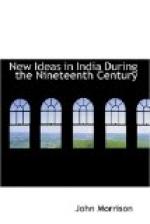III. The [=A]rya Sam[=a]j or Vedic Theistic Association—In contrast to the Sam[=a]jes which are leavening the country but themselves are numerically unprogressive, are two other organisations—first, the [=A]rya Sam[=a]j of the United Provinces and the Punjab, and secondly, the Theosophists, who are now most active in Upper India, with Benares the metropolis of Hinduism, as their headquarters. These two have taken hold of educated India as no other movements yet have done. They appeal directly to patriotic pride and the new national feeling, or, more truly, are primarily shaped thereby.
Founded in 1875, the [=A]ryas are the most rapidly increasing of the new Indian sects. In 1901 they numbered 92,419, an increase in the decade of 131 per cent. What ideas have such an attraction for the educated middle class, for to that class the [=A]ryas almost exclusively belong? In certain parts of the United Provinces and the Punjab, it seems as much a matter of course that one who has received a modern education should be an [=A]rya, as that in certain other provinces he should be a supporter of the Congress.
[Sidenote: Foundation ideas of the [=A]ryas—two.]
The prime motive ideas are two. One is the result of modern education and of Christian influence, namely, a consciousness that in certain grosser aspects, such as polytheism, idolatry, animal sacrifices, caste, and the seclusion of women, the present-day Hinduism cannot be defended. Those things the [=A]ryas repudiate,—all honour to them for their protest in behalf of reason, although in respect of caste and the seclusion of women, their theory is said to be considerably ahead of their practice. In the same modern spirit every [=A]rya member pledges himself to endeavour to diffuse knowledge; and a college and a number of schools are carried on by [=A]ryas in the Punjab. Repudiating all those current customs, of course the [=A]ryas have parted company with the orthodox Hindus. [=A]rya preachers denounce the corruptions of Hinduism, and in turn, what may be called a Great Council of orthodox Hindus has pronounced condemnation on the [=A]ryas. At an assembly of about four hundred Hindu pandits, held in 1881 in the Senate House of the University in Calcutta, the views of the founder of the [=A]ryas, Dyanand Saraswati, were condemned as heterodox.[53]
The second motive idea is the new national consciousness, the new patriotic feeling of Indians. The patriotic feeling is manifest in the name; the [=A]ryas identify themselves with the [=A]ryans, the Indo-European invaders of India, from whom the higher castes of Hindus claim to be descended. Virtually, we may say, the [=A]ryas claim by their name to be the pure original Hindus.
[Sidenote: Infallibility of the Vedas the leading tenet at first.]




